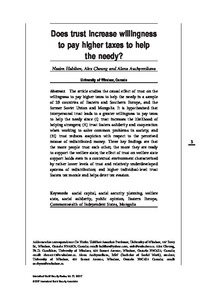Does trust increase willingness to pay higher taxes to help the needy?

Habibov, Nazim ; Cheung, Alex ; Auchynnikava, Alena
International Social Security Review
2017
70
3
July - September
3-30
social capital ; social cohesion ; welfare state ; social security ; public opinion ; survey
Eastern Europe ; South East Europe
Social security financing
http://onlinelibrary.wiley.com/doi/10.1111/issr.12141
English
Bibliogr.
"The article studies the causal effect of trust on the willingness to pay higher taxes to help the needy in a sample of 29 countries of Eastern and Southern Europe, and the former Soviet Union and Mongolia. It is hypothesized that interpersonal trust leads to a greater willingness to pay taxes to help the needy since (i) trust increases the likelihood of helping strangers; (ii) trust fosters solidarity and cooperation when working to solve common problems in society; and (iii) trust reduces suspicion with respect to the perceived misuse of redistributed money. Three key findings are that the more people trust each other, the more they are ready to support the welfare state; the effect of trust on welfare state support holds even in a contextual environment characterized by rather lower levels of trust and relatively underdeveloped systems of redistribution; and higher individual-level trust fosters tax morale and helps deter tax evasion."
Digital
The ETUI is co-funded by the European Union. Views and opinions expressed are however those of the author(s) only and do not necessarily reflect those of the European Union or the ETUI.